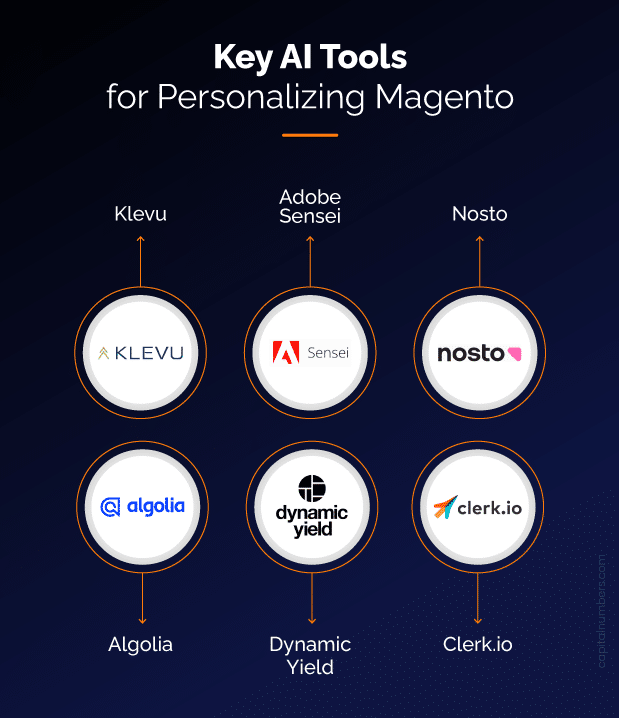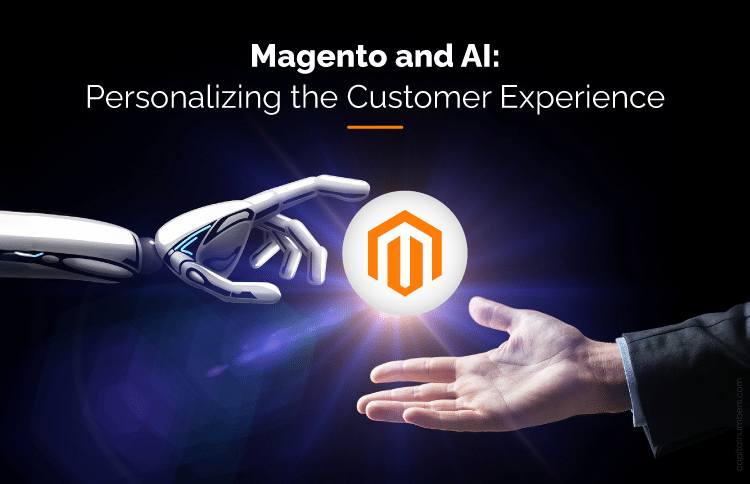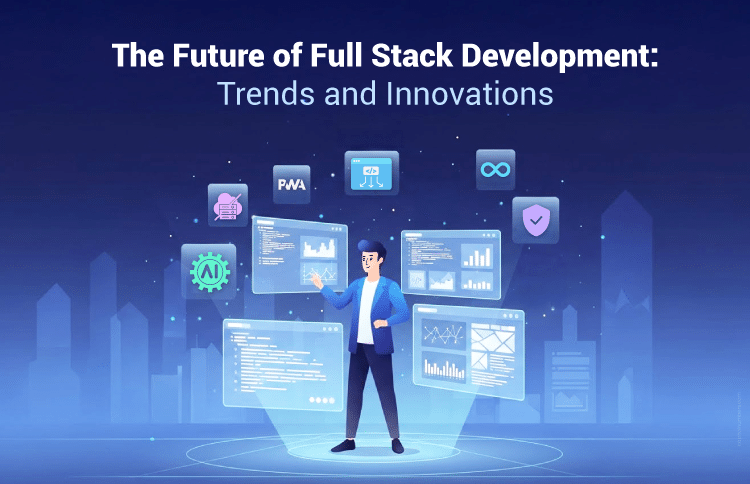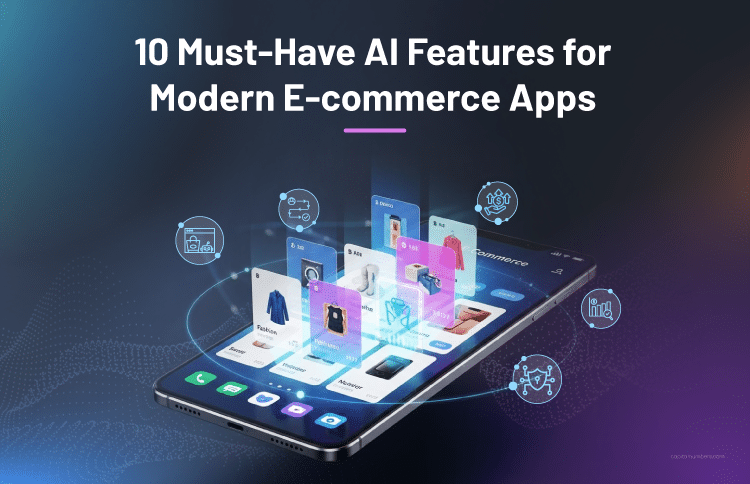Magento and AI: Personalizing the Customer Experience
Table of Contents
Magento is a versatile e-commerce platform, perfect for businesses of all sizes. It offers a wide range of features, including flexible product management, multi-store functionality, robust analytics and reporting, and much more. Magento 2 offers both a free version and a paid Adobe Commerce option, providing comprehensive tools to meet diverse business needs.
Artificial Intelligence (AI) enables computers to simulate human capabilities such as learning, problem-solving, and autonomy. AI applications can analyze data, recognize patterns, and make recommendations, utilizing:
- Machine Learning for predicting trends,
- Deep Learning to mimic the human brain’s neural network, and
- Natural Language Processing to interpret and respond to human language.
The Importance of AI-powered Personalization in E-commerce
AI-powered personalization in e-commerce boosts customer engagement, conversion rates, and loyalty by providing tailored experiences that meet rising customer expectations. AI-based tools in e-commerce enhance the customer journey by recommending products and content based on user preferences, making online shopping more relevant and engaging.
Getting Started with AI in Magento
Magento’s customizable structure allows it to integrate tools effectively. To start:
- Define Goals: Determine objectives like product recommendations or pricing optimization.
- Select AI Tools: Integrate AI tools like Adobe Sensei or Algolia for enhanced personalization.
- Test and Refine: Begin with a few AI features, assess their impact, and expand based on results.
Implementing AI in Magento
Options for integrating AI into Magento include:
- Magento Extensions: AI-driven extensions for product recommendations and customer segmentation.
- Third-Party Integrations: Tools like Adobe Sensei, Nosto, or Dynamic Yield can be connected to Magento.
- Custom AI Solutions: Tailor AI algorithms with Magento’s API for unique needs.
Key AI Tools for Personalizing Magento

Magento merchants can use various AI tools for enhanced personalization:
- Adobe Sensei:
Part of Adobe’s suite, Adobe Sensei uses AI and machine learning to power personalized recommendations, optimize search results, and provide smart product tagging within Magento. It analyzes customer behavior to improve the relevancy of content shown to individual users, creating more tailored shopping experiences. - Klevu:
Klevu enhances Magento’s search capabilities with AI-powered, context-based search and real-time personalization. It understands shopper intent through natural language processing (NLP) and offers more relevant and accurate search results, contributing to higher customer satisfaction and conversions. - Nosto:
This personalization platform provides tailored product recommendations, personalized content, and segmented marketing campaigns. Nosto integrates with Magento to deliver dynamic experiences by analyzing customer behavior, thereby improving engagement and boosting conversion rates. - Algolia:
Algolia provides a powerful search API that integrates with Magento to create fast, intuitive, and personalized search experiences. It uses machine learning to interpret search intent and preferences, improving search relevancy and increasing the likelihood of conversions. - Dynamic Yield:
Known for its ability to deliver real-time personalization, Dynamic Yield integrates with Magento to offer AI-driven product recommendations, personalized content, and dynamic pricing. It enables Magento stores to adapt to individual customer needs dynamically, providing a more interactive and engaging shopping experience. - Clerk.io:
Clerk.io uses AI to personalize product recommendations, optimize on-site search, and automate email marketing for Magento stores. It offers personalized customer experiences by analyzing historical and real-time behavior, helping businesses achieve more relevant product displays and content recommendations.
These tools, when combined with Magento’s robust e-commerce platform, enhance the overall shopping experience, boosting customer engagement, loyalty, and sales by delivering individualized content and offers.
You May Also Read: 10 Marketing Automation Tools to Optimize Your Magento Store
Enhancing Personalization through AI in Magento
Magento, paired with AI, enables unique shopping experiences by analyzing user behavior and real-time data, driving customer engagement and satisfaction.
1. AI Product Recommendations
AI-driven product recommendations analyze browsing and purchase history to suggest relevant products, increasing upsell and cross-sell opportunities. Magento tools like Adobe Sensei and Nosto can deliver these recommendations using:
- Collaborative Filtering: Suggests products based on similar user behaviors.
- Content-Based Filtering: Recommends items based on a customer’s past interactions.
Benefits include higher conversion rates, improved customer loyalty, and increased order values.
2. Chatbots and Virtual Assistants
AI chatbots offer instant, personalized support, handling queries, order tracking, and product suggestions without human intervention. These tools free up resources for complex tasks and enhance customer satisfaction.
3. Dynamic Pricing and Offers
AI can personalize pricing and promotions by analyzing customer behavior. For example:
- New visitors may get a welcome discount,
- Returning customers might see loyalty rewards, and
- Cart abandoners may receive unique offers to encourage checkout.
This personalized pricing keeps the store competitive and responsive to customer needs.
4. AI Context-Based Search
AI-based context search in Magento uses machine learning and NLP to understand search intent, even with vague or error-filled queries. By delivering more relevant search results, it enhances customer experience and reduces bounce rates.
5. Fraud Prevention
AI tools help detect and prevent fraudulent activities by analyzing transaction data in real-time. With adaptive learning, these tools improve fraud detection, ensuring secure transactions and boosting customer trust. AI algorithms can analyze transaction data in real-time to detect and flag suspicious activities, helping Magento merchants reduce fraudulent transactions and chargebacks.
- Real-time Fraud Analysis quickly identifies and prevents fraudulent activities, minimizing financial losses and reputational damage.
- Adaptive Learning Algorithms continuously improve fraud detection capabilities by learning from past patterns and evolving threats.
- Automated Fraud Prevention streamlines the fraud management process, allowing merchants to focus on other strategic priorities.
- Enhanced Customer Trust provides a secure shopping experience, fostering customer loyalty and retention.
6. Virtual Product Trials
Virtual trials allow customers to try products in real time, reducing uncertainties and returns. AI-powered AR provides interactive experiences, increasing confidence in purchases.
7. Personalized Customer Experiences
AI in Magento enables tailored shopping experiences by analyzing customer behavior and purchase history. Store admins can customize site layout and send personalized emails, increasing customer loyalty and engagement.
8. Customized Marketing Campaigns
AI tools enhance marketing by creating targeted campaigns based on customer data. Features include:
- Customer Segmentation: Groups customers by behavior and preferences.
- Personalized Emails: Delivers relevant offers and content.
- Dynamic Recommendations: Updates based on real-time customer behavior.
AI-driven segmentation allows for highly specific targeting, enhancing engagement and conversion rates.
9. Automated Inventory Management
AI-powered inventory management in Magento predicts demand and optimizes stock levels, reducing overstock and stockouts. It uses predictive analytics to forecast trends, helping businesses manage inventory and maintain cash flow. AI analyzes sales trends, seasonality, and market conditions to ensure that the right products are available at the right time. This enhances operational efficiency and also improves customer satisfaction by ensuring product availability. AI/ML can be used for efficient order management.
10. Predictive Analytics
Predictive analytics in Magento forecasts product demand and customer needs, optimizing inventory and marketing strategies. With AI’s predictive insights, Magento merchants can enhance customer experience, driving growth and loyalty. Benefits of AI Predictive Analytics in Magento are as follows:
- Personalize the shopping journey for each individual
- Enhance product recommendation accuracy
- Anticipate customer needs and preferences
- Optimize marketing strategies and campaign effectiveness
- Forecasts what a customer is likely to buy next
- Estimating when a customer is likely to purchase and sending them offers to retain their business
- Identifying high-value customers and offering them VIP experiences or early access to new products
11. Sentiment Analysis
AI tools analyze reviews and feedback to gauge customer sentiment. This data helps Magento merchants improve products and services based on real customer insights. By integrating these advanced AI and machine learning features, Magento development services can significantly enhance the B2B customer experience, leading to increased engagement, satisfaction, and business growth.
You May Also Read: 10 Essential Skills to Look for When Hiring a Magento Developer
Conclusion
The integration of AI in Magento transforms e-commerce by enabling deep personalization and customer-centric features. From product recommendations to sentiment analysis, AI in Magento provides businesses with tools to meet customer expectations, boost loyalty, and stay competitive. Together, Magento and AI create a dynamic, responsive shopping experience that benefits both customers and businesses.
To maximize the potential of Magento’s powerful features and seamlessly integrate AI-driven solutions, businesses should consider hiring Magento developers with expertise in customization and innovation. Skilled Magento developers can help tailor the platform to meet unique business needs, ensuring a competitive edge in the evolving e-commerce market.


















